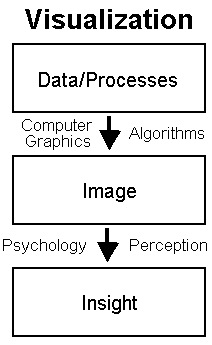NB: Remarkably absent from the document is the substantial body of material from Paul Monk, pending receipt of release from the author.
"The Purpose of computing is insight, not numbers."
| -- Richard Hamming |
| Numerical Methods for Scientists and Engineers |
| "The greatest good of man is daily to converse about virtue." |
| -- Plato |
| Apology |
| "Innumerable challenges await us, but we can expect success if we begin with a will to succeed." |
| -- Raymond Klassen |
| Overcoming the Gravity of Comfort |
 |
"The power of computers to collect, store and manipulate numbers has increased dramatically since Hamming's pointed observation. Much of this increased power, however, is wasted because humans are poor at gaining insight from data presented in numerical form. As a result, visualization research takes on great significance, offering a promising technology for transforming an indigestible mass of numbers into a medium which humans can understand, interpret and explore.
The transformation from numbers to insight requires two stages. As shown in Figure 1, the first maps from numbers (data/processes) to images by means of some algorithmic technique. The second maps from images to insight by means of perception. A true science of visualization must incorporate both a formal theory of computer graphics and a theory of human perception." |
Marc Green, Ph. D.
Toward a Perceptual Science of Multidimensional Data Visualization:
Bertin and Beyond |
|
As Green suggests concerning computation and scientific visualization, so we are proposing (along with others) with regards to computation and discourse: the processes and methods that would enchance creativity, collaborative decision making and group discernment are at hand. --Ben Tremblay, 26JULY04
I have for all my mature life been impressed by people's tenacity, and in no specific more than discussion, whether in electronic forums or newspapers' letters to the editor; as though the deep urge to gather by the fire moving us to congregate and exchange views ... as Y. Bar Hillel put it: "I am reasonably sure that humanity spends more time on argumentation in natural languages than on the pursuit of scientific knowledge." !Q!
Perhaps we seek to clarify our own mind? get a sense of our neighbours'? (see quotes from Maurois and J.S. Mill !Q!)
Perhaps it's only (mere?) conversation ... perhaps discourse, or discussion, or debate, or even some form of argument. I like to think that it has to do with aletheia, where we are bringing something into the light, out of the murk. (see a bit from Software Tools for Collaborative and Educational Sense-Making: "The etymology lies in the Latin argmentum, from arguere which means to make clear." !Q!)
But it seems we're always getting muddled ... and perhaps that's why it's more often more arcane and inchoate social dance than clarification or explication. In Towards a theory of meta-content !Q! R.V.Guha comments, ""There are several problems associated with the expressiveness of the language. The computational complexity of inferencing is too high. The language is too expressive for non-logicians to effectively use." and suggests an approach to the problem. !Q! Likewise with Robert Kent's reminding that "the philosophy of Conceptual Knowledge Processing [... is] a principled approach to knowledge representation and data analysis that advocates methods and instruments of conceptual knowledge processing which support people in their rational thinking, judgment and acting and promote critical discussion."
| "By diagrammatic reasoning, I mean reasoning which constructs a diagram according to a precept expressed in general terms, performs experiments upon this diagram, notes their results, assures itself that similar experiments performed upon any diagram constructed according to the same precept would have same results, and expresses this in general terms. This was a discovery of no little importance, showing, as it does, that all knowledge without exception comes from observation." |
| C S Peirce (1839-1914) |
|
For more information and to signify interest or support please contact Bernard D. Tremblay (Ben) | ab006 AT chebucto.ns.ca
 |